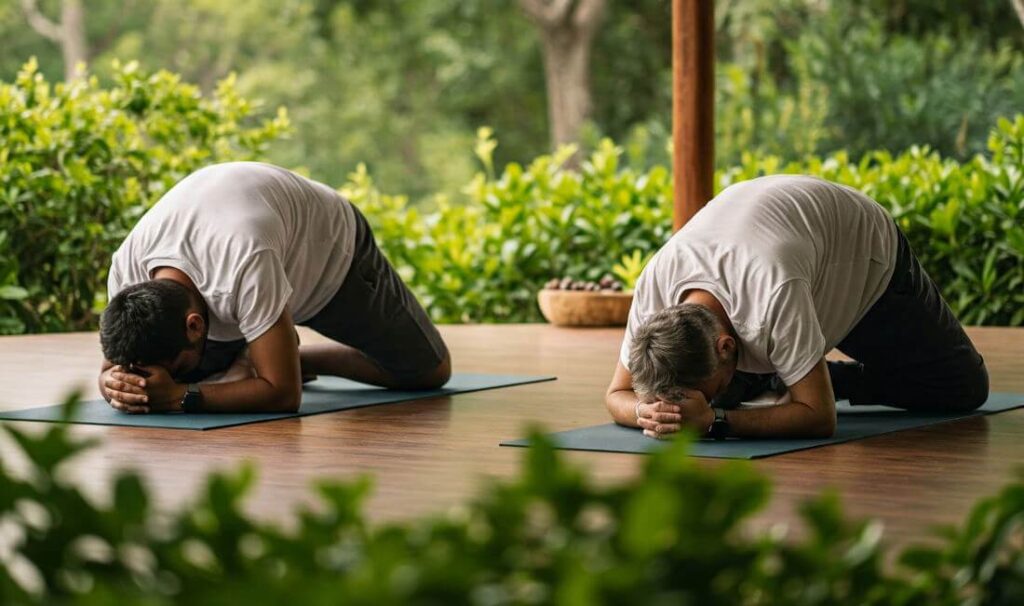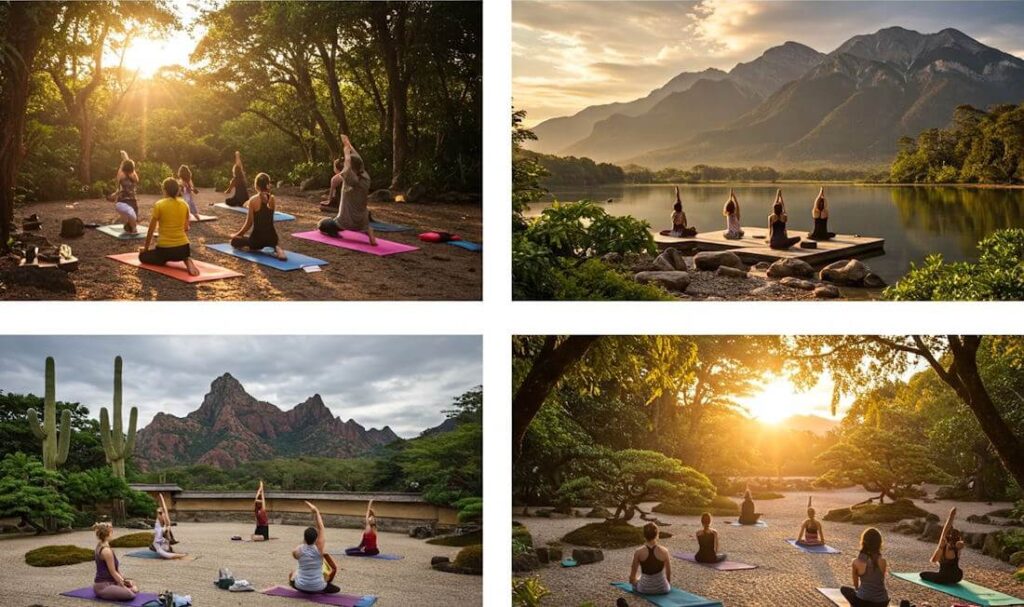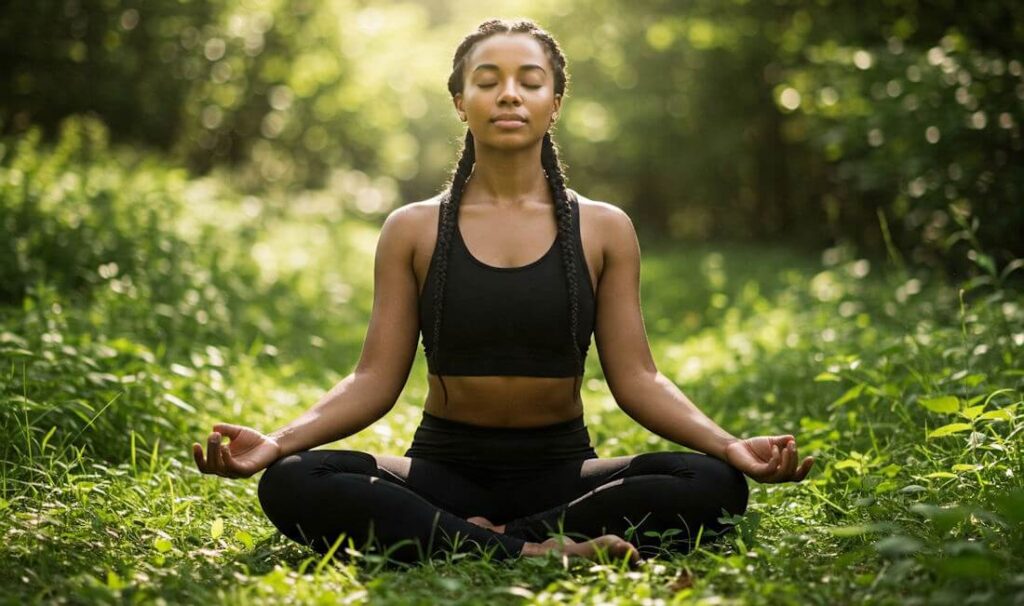Yoga retreats are immersive experiences that facilitate a deeper exploration of yoga, meditation, and personal development. Typically set in tranquil locations such as mountains, beaches, or serene countryside, these retreats offer participants an opportunity to step away from the demands of everyday life and embrace a nurturing environment focused on self-discovery and wellness. The duration of yoga retreats can vary, ranging from weekend getaways to more extended commitments that last a week or even several weeks, depending on the program and the hosting organization.
The primary purpose of yoga retreats is to enhance one’s practice while promoting mental clarity and emotional balance. Participants often engage in daily yoga sessions, meditation practices, and workshops that foster a holistic approach to wellness. This format allows for the integration of different yogic traditions and philosophies, encouraging individuals to deepen their understanding of the practice and its impact on overall well-being.
In recent years, yoga retreats have gained considerable popularity within the wellness culture, appealing to a diverse audience seeking respite from the chaos of modern life. The rising awareness about mental health and the importance of mindfulness has led many individuals to seek out these transformative experiences. For some, a yoga retreat serves as a means to cultivate mindfulness and reconnect with their inner selves, while for others, it represents an opportunity to explore new practices and meet like-minded individuals. Through shared experiences, in the serene setting of a yoga retreat, personal growth and healing are often precipitated, making the retreat a profound journey for many participants.
Lesson 1: Embracing Stillness
In our fast-paced world, the act of embracing stillness often feels unattainable. However, during yoga retreats, participants frequently discover that tranquility is not merely the absence of noise, but a vital component for self-discovery and personal growth. Set in serene environments, these retreats create an ideal backdrop for introspection, allowing individuals to step away from the distractions of everyday life and focus on their inner selves.
The concept of stillness transcends physical quiet; it invites individuals to cultivate a mindful presence. Through meditation and reflective practices, participants learn to slow down and fully engage with their thoughts and feelings. This engagement leads to meaningful insights, fostering a deeper understanding of oneself. By carving out time in a peaceful setting, attendees can explore emotions that may have been overshadowed by daily responsibilities. It is in this stillness that clarity emerges, offering a fresh perspective on life’s challenges.
Lesson 2: The Power of Community
During yoga retreats, the sense of community that develops among participants is one of the most transformative aspects of the experience. This collective environment fosters an atmosphere of trust and vulnerability, allowing individuals to share their experiences, emotions, and personal journeys in ways that might be difficult in their everyday lives. The connections formed in such settings transcend typical social interactions, creating bonds that can be deeply meaningful and supportive.
The act of practicing yoga together—whether it’s through meditation sessions, group classes, or discussions—encourages a shared understanding and connection among participants. Many individuals, who may have previously felt isolated in their personal struggles, discover that they are not alone in their challenges. This revelation can be incredibly empowering, as it provides a sense of belonging and acceptance. Furthermore, the encouragement and support that come from peers during these retreats often catalyze personal growth, enabling participants to confront their vulnerabilities more openly.
Post-retreat, maintaining these connections becomes essential for continued growth and healing. Engaging with a community that shares similar values and practices can facilitate ongoing support long after the retreat has ended. This can take many forms, such as participating in regular meditation or yoga sessions, creating online groups for discussion and encouragement, or simply staying in touch through social media and messaging apps. By nurturing these relationships, individuals can reinforce the lessons learned during the retreat and sustain their commitment to personal growth. Ultimately, the power of community at yoga retreats emphasizes that transformation is often easier and more profound when shared with others, highlighting the importance of connection on the journey toward self-discovery.
Lesson 3: Letting Go of Expectations
One of the most profound lessons learned at yoga retreats is the significance of letting go of expectations. Individuals frequently arrive at these retreats carrying preconceived notions about what their yoga experience or personal transformation should entail. However, through guided practices and thoughtful reflection, participants are encouraged to release these expectations and embrace the present moment instead.
In a world often dominated by pressures to achieve specific outcomes, the practice of yoga encourages practitioners to adopt a mindset of acceptance and flow. The process of letting go begins with acknowledging that each person’s journey is unique. Unlike traditional learning environments, where competition and comparison may thrive, yoga retreats foster a supportive atmosphere that emphasizes self-discovery and personal growth. This transcends the often rigid definitions of success that individuals set for themselves, allowing for a more organic and fulfilling experience.
Strategies for embracing this lesson can include mindfulness practices such as guided meditation or breathwork, which have been shown to help individuals focus on the present and cultivate a sense of gratitude for their current experience. By concentrating on sensations within the body and recognizing thoughts without judgment, participants learn to cultivate an attitude of curiosity rather than expectation. This shift in mindset not only enhances their practice on the mat but also influences their daily lives, enabling them to confront challenges with resilience and openness.
Ultimately, the journey of letting go of expectations encourages personal empowerment. By releasing the desire for predictable outcomes, individuals often discover new aspects of themselves. The insight gained at yoga retreats to embrace the unknown facilitates a transformative shift, enriching both their yoga practice and their everyday experiences. As participants learn to trust in the process, they find peace and freedom, allowing them to fully engage with life as it unfolds.
Lesson 4: Deepening Mind-Body Connection
The practice of yoga is often recognized for its ability to foster a deeper connection between the mind and body. At yoga retreats, participants are encouraged to embrace this connection through mindful practices that promote increased awareness of physical sensations and mental states. This process not only enhances the physical practice of yoga but also leads to profound mental and emotional insights.
One of the key benefits of deepening the mind-body connection during yoga practice is the heightened awareness of one’s own body. When individuals become attuned to their physical sensations, they learn to identify areas of tension or discomfort. This awareness often serves as a guide, helping practitioners modify their postures for optimal alignment and safety, ultimately reducing the risk of injury. Moreover, as individuals engage more deeply with their physical selves, they begin to recognize the correlation between bodily sensations and emotional states. For instance, tight shoulders may signify stress or anxiety, prompting a reflective response that allows the practitioner to address their emotional well-being.
Another significant advantage of cultivating this connection is enhanced emotional regulation. Through mindful breathing and meditation techniques typically practiced at retreats, individuals can learn to recognize their stress responses. This recognition empowers practitioners to implement coping strategies that promote relaxation and resilience. Techniques such as focused breathing, body scans, and guided visualizations create space for mindfulness, facilitating a sense of calm amidst the chaos of daily life.
In many retreats, guided practices are used to further enhance the mind-body connection. These may include movement therapies such as yin yoga or restorative yoga, which emphasize slow, deliberate motions paired with breath awareness. Such practices invite participants to explore their internal landscapes, fostering a greater understanding of how their thoughts and emotions manifest physically. This holistic approach can lead to transformative experiences, allowing individuals to reconnect with their bodies, understand their emotional patterns, and embrace a more balanced state of being.
Tools for Daily Practice
Post-retreat, maintaining the enthusiasm and insights gained during the yoga experience can be challenging without a structured plan. To support a sustainable yoga and mindfulness practice, it is essential to develop practical tools that integrate seamlessly into daily life.
One of the fundamental aspects of establishing a successful yoga practice at home lies in setting clear and achievable intentions. Before engaging in your daily routine, take a moment to reflect on what you wish to achieve through your practice. Whether it’s improved flexibility, stress relief, or enhanced focus, defining your goals can provide motivation and direction. Writing these intentions down and placing them in a visible spot may serve as a constant reminder to prioritize your practice.
Another vital tool is scheduling practice time. Just like any other essential appointment, dedicating specific time slots for yoga and meditation can create a sense of commitment. It is advisable to choose a time that aligns with your natural rhythms, whether that be early morning or after work. Consistency, even if it involves short sessions, will help ingratiate yoga into your daily life, enhancing both physical and mental well-being.
Moreover, incorporating mindfulness meditation into your routine can significantly amplify the benefits derived from yoga. These brief periods of focused breathing can serve as a bridge between your practice and everyday activities. Start with just five minutes of meditation, focusing on your breath or repeating a mantra. This can cultivate awareness and help ground you throughout your day, promoting a calmer mindset amidst daily stressors.
Empowering oneself with these practical tools post-retreat can ensure the lessons learned continue to flourish. By setting intentions, scheduling regular practice, and incorporating meditation, one can foster a holistic approach to well-being that transcends the retreat experience and enriches everyday life.
Personal Stories from Retreat Participants
Yoga retreats often serve as a sanctuary for individuals seeking transformation and personal growth. Participants from various backgrounds have shared their experiences, illuminating the profound impact that these retreats have had on their lives. For instance, Sarah, a corporate executive, attended a retreat seeking relief from the stress that permeated her daily routine. Engaging in deep yoga practices and meditation, she found an unexpected sense of calm and clarity. The retreat not only allowed her to rejuvenate but also revealed the importance of balance in her hectic life. This newfound perspective led her to incorporate mindfulness techniques in her workplace, significantly enhancing her productivity and well-being.
Another compelling story comes from James, a veteran who attended a retreat to cope with his experiences in the military. He discovered that yoga served as a therapeutic tool for healing emotional wounds and fostering connection with others. Through group activities and sharing sessions, he developed bonds with fellow participants, which contributed to his journey toward self-acceptance and understanding. The supportive environment of the retreat allowed him to voice his struggles openly, ultimately empowering him to embrace vulnerability as a strength.
In contrast, Maya, a recent college graduate, sought guidance during a transitional phase of her life, feeling uncertain about her future. At the retreat, she participated in workshops that encouraged self-reflection and exploration of her passions. Focused yoga practices facilitated a deeper connection with her inner self, and she left with a clearer vision of her career path. The skills she acquired at the retreat boosted her confidence and helped forge a supportive community of like-minded individuals.
Each participant’s journey is unique, yet their stories resonate with a common thread of transformation and empowerment. These anecdotes illustrate how the lessons learned during yoga retreats can positively influence lives, encouraging potential attendees to embark on a similar journey of self-discovery.
Challenges Faced During Retreats
Participating in yoga retreats can be a transformative experience, yet it is not devoid of challenges that participants may encounter along their journey. One common challenge is emotional discomfort, which can arise from confronting suppressed feelings or past traumas during the practice. As participants delve deeper into their yoga routines and meditation sessions, they might unearth emotions that have long been buried. This emotional vulnerability can lead to feelings of anxiety or sadness, but such experiences are integral to the healing process. Acknowledging these emotions with compassion rather than resistance can foster personal growth.
Another significant challenge is physical limitations. Many individuals may arrive at a retreat with preconceived notions about their physical abilities. Some may struggle with flexibility, stamina, or strength, feeling discouraged when they compare themselves to others. However, yoga is fundamentally about self-acceptance and progress rather than perfection. Embracing one’s physical limitations and focusing on personal growth can transform discomfort into a source of empowerment. Practitioners are encouraged to listen to their bodies and honor their individual journeys, allowing themselves to grow gradually and sustainably.
Moreover, the experience of stepping out of one’s comfort zone often manifests as a challenge during retreats. Practitioners may find themselves in unfamiliar settings, surrounded by new people and practices that may feel alien. This can invoke feelings of insecurity or fear of judgment. However, it is crucial to recognize that such discomfort is a natural part of the growth process. Embracing the unknown with an open mind and a willingness to adapt can lead to profound personal insight and discovery. Approaching these challenges with kindness, both to oneself and to others, sets the stage for a more enriching retreat experience.
Conclusion
Yoga retreats offer profound insights that can greatly enhance one’s approach to life. The transformative lessons learned during these immersive experiences often extend beyond the duration of the retreat itself, providing valuable tools for personal growth and overall well-being. Central to these lessons is the understanding of mindfulness and presence. Engaging fully in the present moment fosters a deep connection to oneself, which is crucial for managing stress and anxiety in daily life. By incorporating mindfulness practices from yoga, individuals can cultivate a more tranquil state of mind, allowing for clearer decision-making and emotional resilience.
Another essential lesson is the importance of community and support. Retreats often emphasize the power of connection, reminding participants that they are not alone in their journey. By nurturing relationships with like-minded individuals, one can create a support system that encourages continuous growth. Integrating this sense of community into everyday life can significantly enhance motivation and accountability, making it easier to stay committed to personal goals.
Additionally, yoga retreats teach individuals about the necessity of self-care. Prioritizing physical, mental, and emotional health is vital for maintaining balance and resilience. Adopting self-care routines inspired by the practices observed during retreats can lead to improved well-being and a more fulfilling life. This might include regular yoga sessions, meditation, or dedicated time for reflection and self-exploration.
Ultimately, readers are encouraged to reflect on their experiences from yoga retreats or other personal growth endeavors. By identifying which lessons resonate most, individuals can create actionable plans to integrate these teachings into their daily routines. Whether through mindfulness, community support, or self-care practices, the journey toward transformation, resilience, and balance can continue long after the retreat has concluded.
Call to Action: Join a Yoga Retreat
Embarking on a yoga retreat can significantly impact your well-being and personal growth. Such transformative experiences offer the opportunity to immerse yourself in yoga practices, meditation, and mindfulness techniques, fostering a deep sense of connection with oneself and nature. If you are seeking a rejuvenating escape from your daily routine, consider joining a yoga retreat that aligns with your aspirations and values.
When selecting a yoga retreat, it is essential to identify a program that resonates with your personal goals. Whether your focus is on physical fitness, mental clarity, emotional healing, or spiritual exploration, there are numerous retreats available worldwide that cater to a variety of preferences. Research different locations, offerings, and instructors to ensure you choose the right environment for your needs. You may wish to consider retreats held in serene natural settings, as proximity to nature can enhance the benefits of the experience.
Another important factor is the duration of the retreat. Depending on your schedule and availability, you might opt for weekend retreats that offer a brief yet impactful experience or extended retreats that delve deeper into yoga philosophy and practice. Assess how much time you can dedicate, as a longer commitment may lead to more substantial growth and transformation.
Budget considerations are also crucial; retreat costs can vary significantly based on location, accommodations, and included amenities. Seek options that are financially manageable while providing the experiences you desire. Finally, remember to approach this journey with an open heart and mind. Taking the leap to join a yoga retreat can lead to profound insights and lasting change in your life. Embrace the opportunity to foster deeper connections with yourself and others, enriching your overall life experience.



